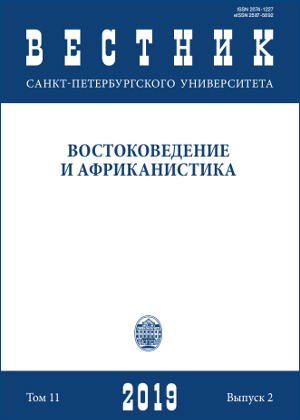“The Tale of an Old Geisha” in Okamoto Kanoko’s Writings
DOI:
https://doi.org/10.21638/spbu13.2019.206Abstract
In 1938 Okamoto Kanoko wrote one of her undisputed masterpieces “Rōgishō” (“The Tale of an Old Geisha”). This is one of several stories painting older women as protagonists. The heroine of this work is independent woman of great passion, generosity, and creative vigor. “Rōgishō” is the story of a retired geisha. Showing the representative of the famous profession, the Japanese writer opens its gender aspect and touches sociocultural questions, which are actual in the androcentristic society. The heroine’s social characteristic defines her narration discurs. The old geisha became the benefactor of a poor but promising young inventor Yuki, however he did not live up to her expectations. He turned out an irresponsible and weak man. She incurred resentment, jealousy, and betrayal from both him and her foster daughter Michiko. Maternal feelings are expressed gracefully in this work, which has characters of traditional Western Bildungsroman fiction. The heroine’s energies turn to the support of Yuki and Michiko for the sense she failed to find in life, but as a result of her straining every effort she is out of spirits and stays in loneliness. Narcissistic and demonic motives, characterizing this author’s fiction coloration, are penetrating to a complex psychological picture of individual characters containing the features of dominance or victimity. Empathic psychology been the basis of heroine’s behavior overcomes the demonic element. The work is distinguished with its lapidarity and discrecity of narration full of implied meanings, allegories and connotations.
Keywords:
modern Japanese literature, geisha, narcissism, demonic motive, allegory
Downloads
References
Downloads
Published
How to Cite
Issue
Section
License
Articles of "Vestnik of Saint Petersburg University. Asian and African Studies" are open access distributed under the terms of the License Agreement with Saint Petersburg State University, which permits to the authors unrestricted distribution and self-archiving free of charge.





